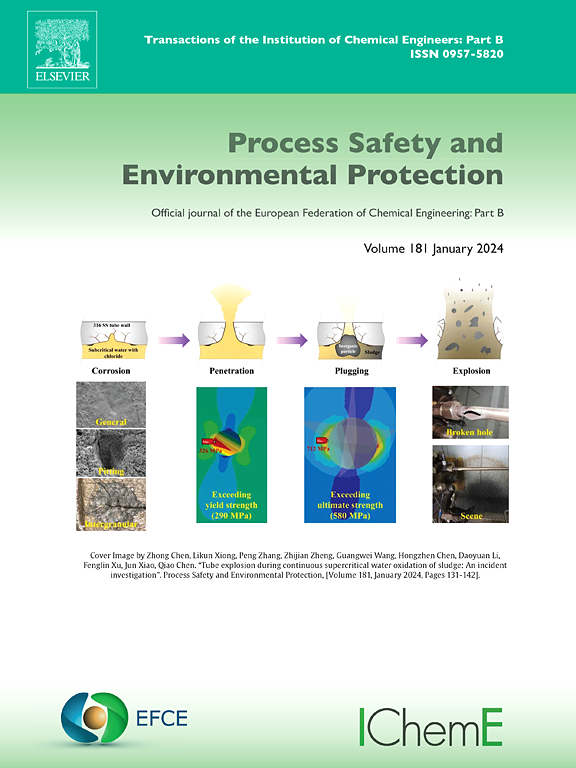利用花岗岩下脚料、花岗岩细泥和磷石膏制备环保型高强度陶瓷石:响应面法优化、环境安全评估
IF 6.9
2区 环境科学与生态学
Q1 ENGINEERING, CHEMICAL
引用次数: 0
摘要
花岗岩碎屑(GS)、花岗岩细泥(GFM)和磷石膏(PG)是花岗岩加工和磷肥生产过程中产生的含有有害物质的固体废物。它们的资源化和无害化利用对减少环境污染具有重要意义。本研究探讨了以 GS 为主料、GFM 为粘结剂、PG 为调节剂制备环保型高强度陶瓷石的方法。通过单因素实验研究了 GS、GFM 和 PG 质量比对陶瓷石性能的影响。利用 Box-Behnken 响应面方法优化了烧结条件对陶瓷石强度的影响。结果表明,陶瓷石的性能受材料配比的影响。烧结温度和保持时间对陶瓷石的强度有显著影响。在最佳制备条件下,陶瓷石的体积密度为 1085.40 kg/m3,表观密度为 2253.63 kg/m3,1 小时吸水率为 0.13 %,盐酸可溶率为 0.016 %,抗压强度为 34.52 MPa。重要的是,高温烧结在固定重金属和降低陶瓷石中重金属的生态风险水平方面发挥了至关重要的作用,从而确保了陶瓷石优异的环保性能和应用前景。本文章由计算机程序翻译,如有差异,请以英文原文为准。
Preparation of eco-friendly and high-strength ceramsite by granite scraps, granite fine mud, and phosphogypsum: Response surface methodology optimization, environmental safety assessment
Granite scraps (GS), Granite fine mud (GFM), and phosphogypsum (PG) are solid wastes containing harmful substances produced during the processing of granite and the production of phosphate fertilizer. Their resourceful and harmless utilization holds great significance in reducing environmental pollution. This study explores the preparation of eco-friendly and high-strength ceramsite using GS as the primary material, GFM as the binder, and PG as the regulator. The performance of ceramsite was studied by conducting single-factor experiments to examine the impact of the GS, GFM, and PG mass ratios. The Box-Behnken response surface methodology was utilized to optimize the effect of sintering conditions on the strength of ceramsite. The results suggested that the properties of the ceramsite are affected by the material ratios. The sintering temperature and keeping time notably influence the strength of ceramsite. Under optimal preparation conditions, the ceramsite achieved a bulk density of 1085.40 kg/m3, apparent density of 2253.63 kg/m3, 1-h water absorption of 0.13 %, hydrochloric acid soluble rate of 0.016 %, and compressive strength of 34.52 MPa. Importantly, high-temperature sintering plays an essential role in fixing heavy metals and reducing the ecological risk level of heavy metals in ceramsite, which ensures excellent environmental performance and application prospects for ceramsite.
求助全文
通过发布文献求助,成功后即可免费获取论文全文。
去求助
来源期刊

Process Safety and Environmental Protection
环境科学-工程:化工
CiteScore
11.40
自引率
15.40%
发文量
929
审稿时长
8.0 months
期刊介绍:
The Process Safety and Environmental Protection (PSEP) journal is a leading international publication that focuses on the publication of high-quality, original research papers in the field of engineering, specifically those related to the safety of industrial processes and environmental protection. The journal encourages submissions that present new developments in safety and environmental aspects, particularly those that show how research findings can be applied in process engineering design and practice.
PSEP is particularly interested in research that brings fresh perspectives to established engineering principles, identifies unsolved problems, or suggests directions for future research. The journal also values contributions that push the boundaries of traditional engineering and welcomes multidisciplinary papers.
PSEP's articles are abstracted and indexed by a range of databases and services, which helps to ensure that the journal's research is accessible and recognized in the academic and professional communities. These databases include ANTE, Chemical Abstracts, Chemical Hazards in Industry, Current Contents, Elsevier Engineering Information database, Pascal Francis, Web of Science, Scopus, Engineering Information Database EnCompass LIT (Elsevier), and INSPEC. This wide coverage facilitates the dissemination of the journal's content to a global audience interested in process safety and environmental engineering.
 求助内容:
求助内容: 应助结果提醒方式:
应助结果提醒方式:


